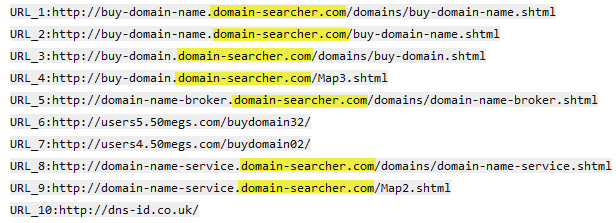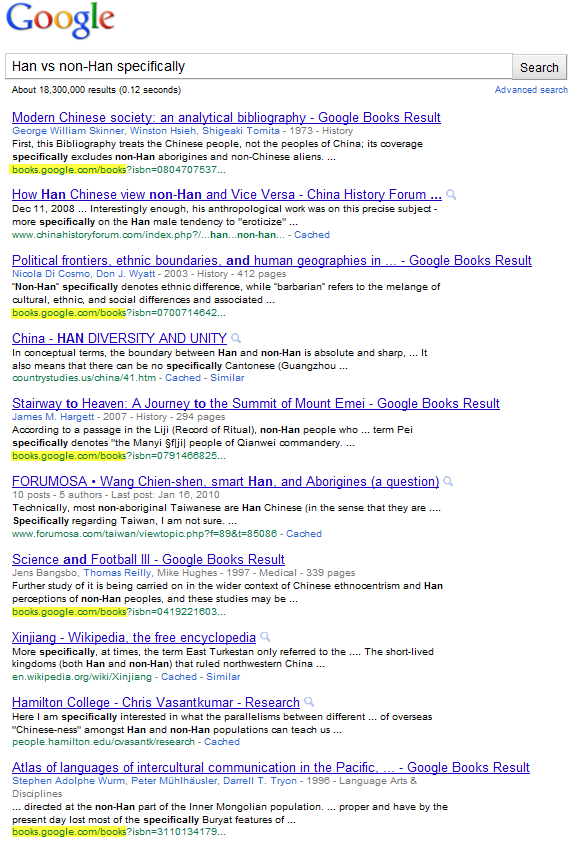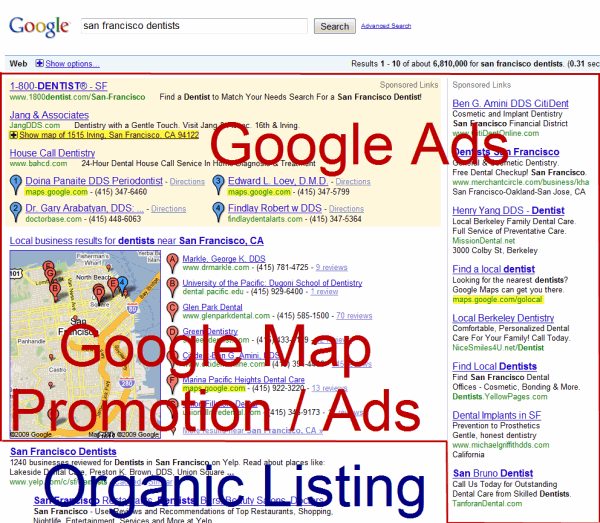Google Throws the Book at Competitors
You can learn a lot about how search has improved over the years by reading Matt Cutts. Recently he highlighted how search was irrelevant in the past due to a lack of diversity:
Seven of the top 10 results all came from one domain, and the urls look a little… well, let’s say fishy. In 1999 and early 2000, search engines would often return 50 results from the same domain in the search results. One nice change that Google introduced in February 2000 was “host crowding,” which only showed two results from each hostname. ... Suddenly, Google’s search results were much cleaner and more diverse! It was a really nice win–we even got email fan letters.
Thanks to those kinds of improvements, in 2011 we never have to look at search results like this.*

* And by never, I mean, unless the results are linking to fraternal Google pages, in which case, game on!

Why should Google result crowding not apply to Google.com? Sure they can say those books are from different authors, but many websites are ran by organizations with multiple authors. Some websites are even built through the partnerships of multiple different business organizations. Who knows, maybe some searchers are uncomfortable with every other listing being an out of context book highlight.
In the past I have been called cynical for highlighting stuff like the following image

I saw it as part of a trend toward home cooking promotions. And I still view it that way. The above books promotion is simply further proof of concept.
Outside of...
- Youtube
- other Google owned and operated sites
- a branded website ranking for its own brand
Can you show me *any* occurrence of a result where a site is listed 5 times in the search result? Bonus points if you can find it where the 5 times are not grouped into 1 bunch via result crowding.
Other than a home cooking override, how is it possible that this problem fixed years ago suddenly re-appears?
As a thought experiment, ask yourself if that Google ranking accident would happen if the content archive being served up was promoting media hosted on Microsoft servers.
A friend of mine summed it up nicely with:
well, it's not everyday you see that kind of power and the fact that other sites aren't afforded the same opportunity makes me think that they are being anti-competitive. Google literally wrote the book (ok scraped it) on anti-competitive practices.




Comments
Great post
Are you sure there is no possibility that Google shows up 5 times organically? After all, it is a high profile, high authority site. Should it be treated like any other site with that level of authority would? Aaron, you make some interesting points as usual, but I'm not sold on the 'unfairness' of the situation.
Can you show me a *single* example like the above?
Outside of a brand ranking for its own branded keyword and Google ranking Google-owned sites the answer is likely a big fat no.
And it is a *certain* no when you consider that the fraternal results are mixed in back and forth throughout the search results, rather than being grouped together.
Google didn't believe that Bing deserved any benefit-of-doubt when Google was accusing them of copying search results. Why does Google deserve more leeway than they offer their competitors or other webmasters?
It is also worth mentioning that their ebooks started ranking inside the US immediately after Google gained the rights to sell them & opened their ebook store. And they still didn't rank as well outside the US. If you believe that is a coincidence I have a bridge to sell you!
Four, yes, but five no. Unless I'm logged in and the fifth result comes from the beta listing from those in my social circle.
is not just the number of listings...but also how they were spread out throughout the search results.
Like if you search on "amazon" or "eBay" the branded site will rank many times for the name of its own brand, but I haven't seen any site ranking for generic keywords in the search results 5 times like that...and doubly true in terms of the listings being spread out like they are in the above example.
I'm sure it's just, you know, like, a misunderstanding.
It's not like Google tried to wholesale infringe the copyright of millions of authors to make money: http://www.tech-progress.org/?p=462
It's not like they were supposed to clean up the piracy results, but didn't: http://paidcontent.org/article/419-congress-asks-google-why-do-searches-...
It's not like they ban "thin" affiliates and comparison shopping results and then launched their own- and threw in another ad unit too: http://searchengineland.com/google-showing-four-top-adwords-ads-top-one-...
It's not like they promised French regulators they would abide by their new Adword's agreement worldwide to stop the investigation and then didn't: http://www.everstatus.com/04/01/adwords-egregious-bans-ftc-french-regula...
I'm sure this all a misunderstanding. The Googleplex is most likely a covert orphanage and is serving milk and cookies right now to underprivileged children.
served! ;)
Awesome hah :)
http://www.google.com/search?q=modetnity&pws=0&hl=en&num=10#hl=en&pws=0&...
Google has the top 8 results. Sad.
I found this post fascinating. And I think it is right on to call them out for this practice. Last night, after reading this post I was searching Google for a book for my fiancee, so I typed in david j leiberman never be lied to again. (good book, I recommend reading it). Amazon was actually listed 5 times. The first four were grouped at the top, as you said, and then amazon uk showed up 8th. I am sharing this not to disprove or argue with you, I think you're dead on, but you said to be on the lookout for instance of 5 search results like that, so here's one. Keep up the good work!
those were 2 separate sites & the first site was all grouped together
further, you misspelled his name. if you spell it correctly amazon.com is listed twice, amazon.co.uk is not listed, and books.google.com is listed ;)
Keep up the good work folks.
These search results are totally awful. Worse than 1996 search.
Google is littering search with itself hogging up the top places where people have been trained to click.
More concerning is long tail searches of 3 or more words continue to drop. People are being trained to live in a single word funnel by Google. Google then is analyzing the noun and showing local options to fulfill that noun need (i.e. local Places).
Google pretends that this is an improvement to search, when in fact it's turning people into search idiots.
That explains the big financial push behind Place, which I should mention is massively scraped data. That new $700 million travel company buyout comes with a subsidiary which writes fairly good, website scraping and merging software for building, get this, essentially Google Places.
Experian Hitwise spills out the reality with Google returning valid search data something like 65% of the time currently. That's a D rating in my neighborhood and that's truly a failure. Sad thing is Google has been parked in that failing area for at least a year, and I suspect it might actually be multiple years now.
If you have a thing for Google, we write about them multiple times a day (many 400+ word pieces).. Come on by and say hello: http://googlemonopoly.eu.
http://www.seobook.com/all-your-book are belong to us :D
Add new comment